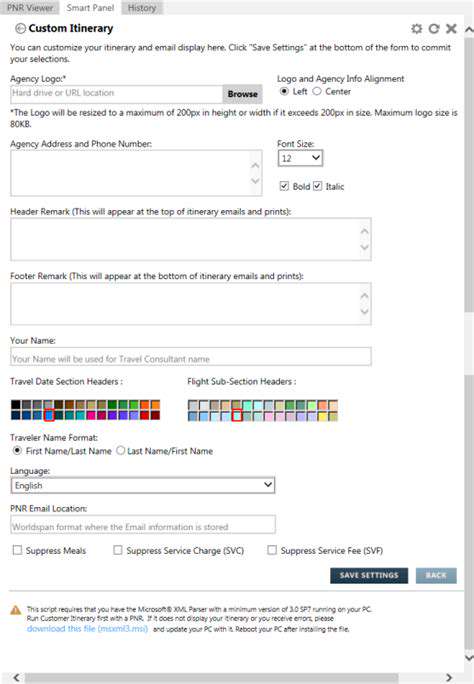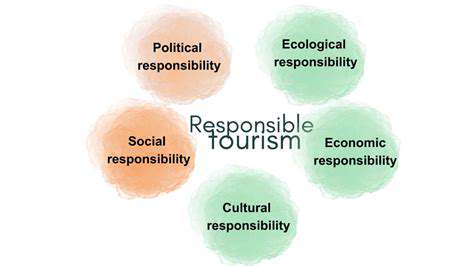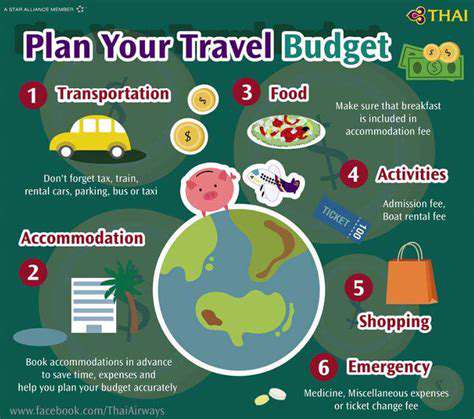Planning Ahead for a Smooth Trip
Traveling with chronic health conditions demands meticulous preparation that goes beyond standard vacation planning. Your medical needs must take center stage when organizing international travel. Start by creating a comprehensive checklist that includes all prescribed medications (with at least two weeks' extra supply), necessary medical equipment, and copies of important health records. Consulting your healthcare provider at least six weeks before departure allows time for any required vaccinations or health evaluations.
Investigate healthcare infrastructure at your destination thoroughly. Identify hospitals with English-speaking staff, 24-hour pharmacies, and specialists relevant to your condition. Many travelers overlook time zone changes when scheduling medication doses - work with your doctor to adjust your regimen if crossing multiple time zones. Keep emergency contacts programmed in your phone, including your country's embassy and local emergency services.
Understanding Your Specific Needs
Every medical condition presents unique travel challenges. Those managing diabetes need strategies for insulin storage and blood sugar monitoring during flights. Cardiac patients should research altitude effects and carry recent EKG results. Respiratory conditions may require pre-approval for oxygen use on aircraft. Never assume airlines or hotels can accommodate special requests without advance notice - most require documentation from your physician.
Environmental factors often impact chronic conditions unexpectedly. Humidity exacerbates joint pain for arthritis sufferers, while dry air worsens respiratory symptoms. Research seasonal weather patterns and pack accordingly - compression socks for long flights, portable humidifiers, or cooling vests for heat sensitivity. Discuss potential triggers with your specialist and develop contingency plans.
Choosing the Right Accommodations and Transportation
Hotel selection requires careful evaluation beyond standard accessibility features. Look for properties with refrigerators for medication storage, blackout curtains for sleep disorders, or hypoallergenic bedding. Ground-floor rooms or properties with elevators prevent mobility challenges after tiring excursions. Contact hotels directly to confirm they can meet your specific needs rather than relying on generic accessibility claims.
For transportation, investigate airline policies for medical equipment - many carriers require 48-hour notice for oxygen concentrators or mobility devices. When booking trains or buses, verify wheelchair accessibility and assistance availability. Consider travel insurance that covers last-minute cancellations if your health precludes travel. Always build extra time into connections to reduce stress.
Accessing Support and Resources
Specialized travel agencies focusing on medical tourism can provide invaluable assistance. They maintain networks of vetted healthcare providers worldwide and understand complex logistics like medical equipment transport. Online communities like the Hidden Disabilities Sunflower program offer discreet identification tools and destination-specific advice from fellow travelers with similar conditions.
Register with your embassy's Smart Traveler Enrollment Program when visiting foreign countries. This ensures consular officials can assist during medical emergencies. Carry a translated summary of your conditions and medications - many hospitals provide template forms for international patients. Digital tools like Medi-C Alert store encrypted health records accessible worldwide.
Customizing Itinerary for Medical Requirements

Pre-Trip Consultation and Planning
A detailed medical travel consultation should address three key areas: current treatment protocols, destination-specific risks, and contingency planning. Request a letter from your physician detailing your conditions, medications (with generic names), and necessary equipment. This documentation proves invaluable during security screenings and medical emergencies abroad.
Research medication legality at your destination - some common prescriptions are controlled substances elsewhere. The International Narcotics Control Board website provides country-specific regulations. Schedule medical appointments during less crowded travel periods when possible, as staff have more time to address special needs.
Accommodation Considerations
Beyond standard ADA compliance, evaluate lodging through a medical lens. Properties near major hospitals offer peace of mind, while those with kitchenettes allow special diet preparation. For immune-compromised travelers, inquire about cleaning protocols and request hypoallergenic rooms. Many resorts now offer wellness rooms with air purifiers and circadian lighting.
Contact accommodations directly to discuss specific needs - can they provide extra pillows for reflux sufferers? Are shower benches available? Will staff store perishable medications? Document all agreements in writing and bring confirmations. Consider renting medical equipment locally through services like Scootaround to avoid transport hassles.
Transportation Logistics
Air travel requires careful coordination for medical needs. The TSA Cares program assists passengers with disabilities and medical conditions during security screenings. For long flights, request bulkhead seats with extra legroom or aisle access. Always carry medications in original labeled containers - customs officials may require verification.
Research ground transportation options at your destination. Many cities offer wheelchair-accessible taxis, but availability varies. Ride-sharing apps often have accessibility filters. For road trips, plan frequent stops for stretching and medication administration. Portable medical devices should have appropriate power adapters and backup batteries.
Dietary Restrictions and Needs
Managing dietary needs abroad requires proactive communication. Translate essential food restrictions into the local language and carry printed cards. Research restaurant menus in advance and identify safe options. For severe allergies, consider accommodations with kitchens to prepare safe meals. Some cruise lines and resorts employ chefs specifically trained in dietary restrictions.
Pack non-perishable safe snacks in case suitable food isn't available. For conditions like celiac disease, research grocery stores stocking specialty items. Notify airlines of dietary needs when booking - most require 48-hour notice for special meals. Consider bringing enzyme supplements if lactose intolerance or other digestive issues are concerns.
Medical Support Personnel
For complex medical needs, traveling with a healthcare professional provides security. Many home care agencies offer travel companions trained in specific conditions. Medical escort services specialize in transporting patients requiring continuous care during transit. Some luxury resorts partner with local medical providers for on-call services.
Document all care instructions thoroughly if using local medical services. Create detailed medication schedules and emergency protocols. Video consultations with your home physician can bridge gaps in care continuity. Some travel insurance policies cover the cost of medical accompaniment - verify coverage details in advance.
Cultural Considerations
Health-related customs vary significantly across cultures. In some countries, discussing medical conditions openly is taboo, while others have specific healing traditions. Research local attitudes toward disabilities and chronic illness to avoid misunderstandings. Some cultures prioritize family involvement in medical decisions, which may affect treatment abroad.
Language barriers present serious health risks. Learn key medical phrases in the local language. Apps like MediBaboon provide medical translation services. Understand how emergency services operate - in some countries, ambulances aren't the primary emergency response. Cultural guides specific to healthcare can prevent dangerous miscommunications.
Emergency Contingency Planning
A comprehensive emergency plan should include: local emergency numbers, insurance contact information, embassy details, and evacuation protocols. Carry a laminated emergency card in the local language listing your conditions, allergies, and emergency contacts. Program these details into your phone's emergency access features.
Identify medical facilities at each destination and alternate options in case of overcrowding. Know where to obtain emergency medication refills. Some credit cards provide emergency medical evacuation services - verify coverage limits. Share your itinerary with trusted contacts who can coordinate assistance if needed.

Ensuring Medical Insurance and Emergency Preparedness
Securing Comprehensive Medical Insurance
Standard health insurance rarely covers international care adequately. Specialized travel medical insurance should cover pre-existing conditions, emergency evacuation, and repatriation. Read exclusions carefully - many policies exclude high-risk activities or certain destinations. Consider evacuation coverage amounts carefully - air ambulance costs can exceed $100,000.
For frequent travelers, annual multi-trip policies often prove cost-effective. Keep digital and physical copies of your insurance card and policy details. Understand claim procedures - some insurers require pre-authorization for non-emergency care. Medical tourism policies specifically cover planned overseas treatments with lower deductibles.
Developing a Robust Emergency Preparedness Plan
Create a customized emergency binder containing: medication lists (with generic names), doctor contacts, insurance information, and health history. Store digital copies in secure cloud storage accessible offline. Designate emergency contacts who can make medical decisions if you're incapacitated - carry notarized authorization documents.
Research how to access emergency cash abroad - some conditions may require unexpected medical payments. Know embassy procedures for medical emergencies involving citizens. Pack a basic first aid kit tailored to your needs - include supplies for wound care, fever reduction, and condition-specific items.
Packing Essentials for Medical Needs
Beyond medications, pack supporting items: pill organizers, sharps containers, alcohol wipes, and documentation. Carry critical medications in your carry-on in multiple containers in case of lost luggage. For temperature-sensitive medications, use insulated cases with temperature monitors. Include extra supplies for potential delays.
Portable medical devices should have appropriate power adapters and voltage converters. Bring spare parts for essential equipment. Consider wearable medical alert devices that work internationally. Pack comfort items that help manage symptoms - heating pads, compression garments, or specialized pillows.
Leveraging Technology and Resources for Enhanced Support
Optimizing Travel Experiences Through Data Analysis
New apps analyze personal health data to predict travel challenges. Platforms like TravelDoc cross-reference medical profiles with destination health risks. Some services track medication schedules across time zones automatically. Wearable devices can alert travelers to concerning health trends during trips.
Digital travel assistants can learn your preferences and health needs over time, suggesting suitable destinations and activities. Apps now integrate real-time air quality, pollen counts, and weather data to help those with environmental sensitivities plan accordingly. These tools empower travelers to make informed decisions about their itineraries.
Personalized Itinerary Recommendations
AI-powered platforms can design trips around health constraints. Services like AbleThrive curate accessible activities based on mobility levels. Some apps suggest rest periods between activities for chronic fatigue sufferers. Digital planners can factor in medication schedules when building daily agendas.
Dynamic itinerary tools adjust plans based on real-time health data. If a wearable detects elevated stress levels, the system might suggest a less strenuous alternative activity. Some platforms connect travelers with similar conditions to share destination-specific tips and recommendations.
Utilizing Technology for Accessibility and Inclusivity
Augmented reality apps now help navigate cities with mobility challenges, identifying accessible routes in real-time. Voice-activated assistants can control hotel room environments for those with limited mobility. New translation devices specialize in medical terminology for accurate healthcare communication abroad.
Digital accessibility maps detail everything from bathroom dimensions to counter heights. Some museums offer sensory-friendly virtual tours for those who can't visit in person. These innovations make previously inaccessible experiences available to all travelers.
Creating Seamless Communication Channels
Dedicated travel support apps connect users with medical professionals worldwide. Telemedicine platforms allow consultations with doctors familiar with your medical history, regardless of location. Some services provide 24/7 access to nurses for travel-related health questions.
Automated systems can notify hotels, airlines, and tour operators about special needs discretely. Digital journals help track symptoms and medication effects during trips. These communication tools bridge gaps in care continuity while traveling.
Empowering Travelers with Control and Flexibility
New platforms allow travelers to build customized accessibility profiles that automatically apply when booking. Digital health passports securely store medical information for easy access during emergencies. Some apps let users adjust plans instantly based on how they're feeling each day.
Real-time crowd monitoring helps those with anxiety avoid overwhelming situations. Flexible booking options accommodate last-minute changes due to health fluctuations. These innovations give travelers with health conditions unprecedented control over their experiences.






